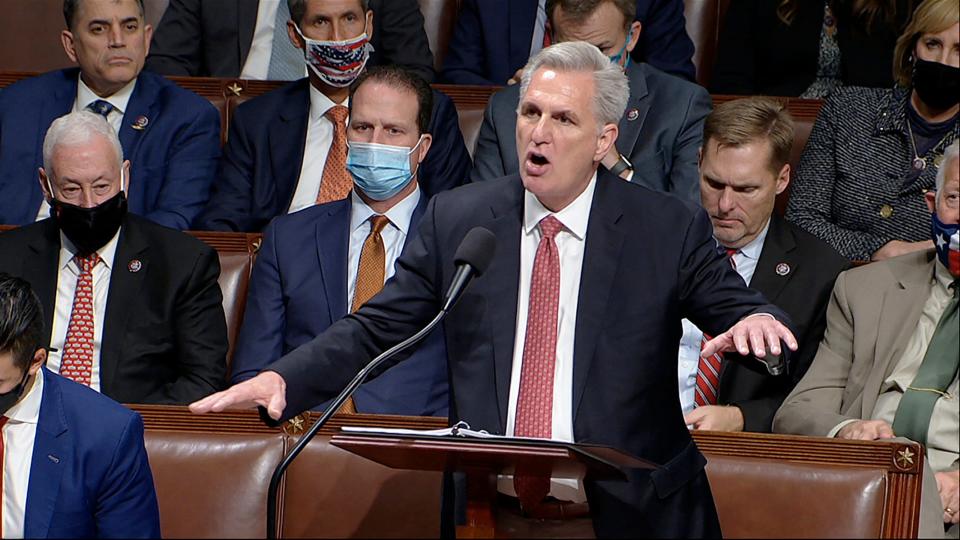Democrats and Republicans compete for title of who's more foolish in leading America
Democrats took a drubbing in elections this month, in part, for simply failing to govern. Endless bickering within their congressional caucus squandered chances to pass major reforms in infrastructure, climate and social policies.
So why are Republicans rushing to make the same mistake?
When a chastened Democratic House leadership finally held a vote on a $1.2 trillion infrastructure bill several days after the election, the popular and needed legislation passed with the help of 13 House Republicans.
That GOP baker's dozen gave their constituents what they wanted, federal investment to restore crumbling roads and bridges. And they did it through consensus, exactly what most voters demand of politicians.
Yet fellow Republicans are vilifying them as outcasts, traitors and RINOs (Republicans in Name Only) for committing the unpardonable sin of working with Democrats to improve the lives of Americans.
Death threats
There's talk of stripping the 13 of committee assignments, an idea quickly endorsed by former White House chief of staff Mark Meadows. One of those attacked, Rep. Fred Upton of Michigan, received death threats after his phone number was tweeted out by a complaining GOP House member.
Through it all, House Minority Leader Kevin McCarthy, R-Calif., has remained conspicuously silent. And of course former President Donald Trump, who lives in a world where gains are measured only by someone else's loss, bashed the 13 Republicans for shamefully "helping the Democrats."

Whatever happened to helping the American people?
Beyond the raw political calculus of political obstructionism, the only policy argument Republicans in the House made was labeling the bill "socialist" spending.
From Roosevelt to Eisenhower and beyond
But federal investment in the nation's infrastructure of road, rails, bridges and water systems has a rich legacy dating from President Franklin Roosevelt's New Deal of the 1930s, through passage of the Federal-Aid Highway Act of 1956 under Republican Dwight Eisenhower, to major highway and water utilities build-outs in the 1970s-80s.
Indeed, Trump pursued his own trillion dollar plan, repeatedly promising action during various "infrastructure weeks" that came to nothing.
In fact, major federal investment to repair the nation's aging infrastructure is so long overdue that the bill, now signed into law, is only half of what the American Society of Civil Engineers says the country needs.
"Make no mistake, (this) vote was about roads, bridges, and clean water," tweeted one of the 13 Republicans, Rep. Andrew Garbarino of New York. "It was about real people, and the tangible action Congress could take to better their lives by rebuilding and revitalizing our nation's crumbling infrastructure."
It's a sensible view that prevailed in the Senate, where the infrastructure bill passed in early August 69-30 with the help of 19 Republicans. Yet in the House, Democrats delayed it for months because of bickering. And Republicans (all but 13) trashed it largely for political expediency.
So what are voters to make of all this?
Democrats are far more wounded now. President Joe Biden's approval is at an all-time low, despite popular policies. Voter preferences ahead of 2022 midterm elections have Republicans with a 10-point lead. And as the party in power, albeit by the narrowest of margins in Congress, Biden and Democrats are getting hammered over inflation, COVID-19, border crossings and a disastrous Afghanistan withdrawal.
It's no surprise then that many Americans may well be searching for an alternative. It's just too bad Republicans aren't giving them one.
USA TODAY's editorial opinions are decided by its Editorial Board, separate from the news staff and the USA TODAY Network. Most editorials are coupled with an Opposing View, a unique USA TODAY feature.
To read more editorials, go to the Opinion front page or sign up for the daily Opinion email newsletter. To respond to this editorial, submit a comment to letters@usatoday.com.
This article originally appeared on USA TODAY: Infrastructure to elections: Democrats, Republicans race to lose votes

